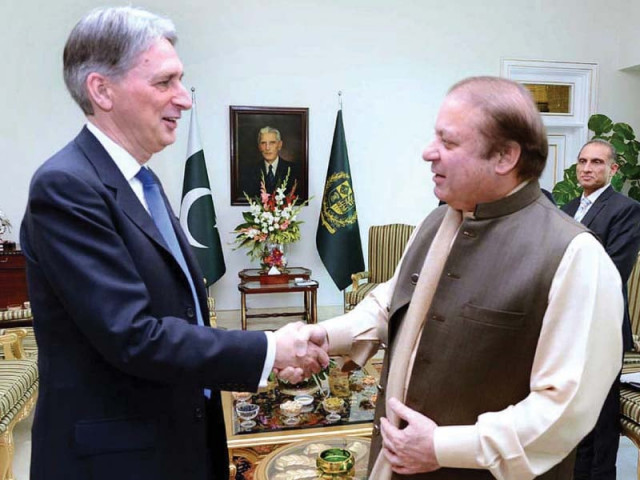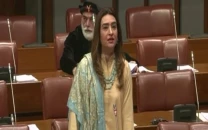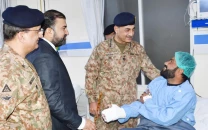UK urges Pakistan, India for uninterruptible talks
Kashmir issue should not be a precondition for resumption of talks, says British FS

PM Nawaz shakes hands with the British foreign secretary. PHOTO: APP
As Pakistan and India struggle to resume their long-stalled peace talks, British Foreign Secretary Philip Hammond has urged the two hostile neighbours not to allow non-state actors to derail the dialogue process.
“I urge both Pakistan and India not to allow non-state actors and other pressure groups to derail peace talks,” said the top British diplomat on Tuesday at a joint news conference with Prime Minister’s Adviser on Foreign Affairs Sartaj Aziz.
Hammond, who flew into Islamabad from Kabul, held talks with Aziz and also called on Prime Minister Nawaz Sharif as well as army chief General Raheel Sharif.
His statement on Pakistan-India peace talks is apparently directed at New Delhi, which is reluctant to reengage with Islamabad following the January 2 attack on Pathankot airbase in Indian state of Punjab.
A crucial meeting between the foreign secretaries of Pakistan and India was to take place in the middle of January but both sides mutually agreed to postpone it days after gunmen stormed the Pathankot airbase.
Initially, India blamed militants from the Pakistan based Jaish-e-Muhammad (JeM) group for the attack but later alleged that the attackers had state support in Pakistan.
In a somewhat balancing act, Hammond said settlement of longstanding Kashmir issue should not be a precondition for resumption of peace talks. “There are so many other practical issues the two countries need to discuss,” he added.
Asked about the prospects of resumption of talks, Aziz hoped a meeting would take place soon as the Indian high commissioner himself stated that talks were not linked with the Pathankot probe. “A joint investigation team (JIT) is in the process to complete the probe and will visit India in a few days,” Aziz said.
The British foreign secretary welcomed Pakistan’s commitment to vigorously pursuing investigation into the Pathankot attack while urging Islamabad to expedite the process.
Aziz also confirmed the government shared intelligence with New Delhi about a possible terror attack in India. “Sharing of intelligence among various nations of the world is a routine practice and this happens around the world. However, this time it was somehow leaked to media. But this showed Pakistan’s commitment to fighting terrorism,” he said.
Afghan peace talks
The British foreign secretary also discussed efforts seeking direct talks between the Afghan government and the Taliban. He appreciated Pakistan’s efforts to bring the Taliban to the negotiating table.
The fate of direct talks hangs in balance after the Taliban recently refused to join the process. The talks were expected to take place in the first week of March in Islamabad.
Despite missing the deadline, Aziz hoped the process would begin soon. He, however, asked the Afghan Taliban not to attach preconditions to the peace process. “The Taliban’s demands such as prisoners release as well as lifting restrictions on their leaders can be achieved through talks, not before it.”
Secretary Hammond meets General Raheel
The British foreign secretary also visited the General Headquarters in Rawalpindi and called on army chief General Raheel Sharif. During the meeting, matters of mutual interest, including security situation in the region, were discussed.
He praised Pakistan’s fight against terrorism and acknowledged the sacrifices the country had rendered in this battle. “I salute Pakistan for their fight against terrorism,” Hammond said.
He said Pakistan was the biggest victim of terrorism. “Despite challenges, Pakistan has seen considerable improvement in overall security situation.”
Published in The Express Tribune, March 9th, 2016.



















COMMENTS
Comments are moderated and generally will be posted if they are on-topic and not abusive.
For more information, please see our Comments FAQ